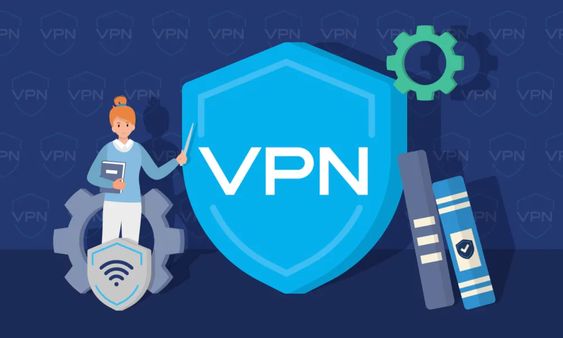It is important to understand that while some VPNs offer features that can be attractive to ethical hackers, using a VPN for malicious purposes is illegal. Hackers may use VPNs for a variety of reasons, but it is important to remember that using a VPN for illegal activities is a crime.
Here are some of the VPNs that are popular among ethical hackers:
- ExpressVPN: This VPN service is known for its fast speeds and strong security features. It offers a strict no-logs policy and uses military-grade encryption to protect your data.
- NordVPN: This VPN service is another popular option for hackers. It offers a large network of servers, strong security features, and a strict no-logs policy.
- Surfshark: This VPN service is a good option for budget-minded hackers. It offers unlimited connections and a variety of security features.
- CyberGhost: This VPN service is a user-friendly option that offers good speeds and security features.
- Private Internet Access: This VPN service is a good option for privacy-conscious users. It offers a variety of security features and a strict no-logs policy.
It is important to note that not all VPNs are created equal. When choosing a VPN, it is important to consider your needs and choose a VPN that offers the features that are important to you. You should also make sure to choose a reputable VPN provider with a good track record.
VPNs and Their Significance
VPNs serve as encrypted tunnels that route internet traffic through secure servers, masking users’ IP addresses and encrypting data transmissions. This technology enables users to browse the web anonymously and securely, shielding their online activities from prying eyes. Don’t Miss to Check Out Our Website: Globall Browse

Understanding Hackers and Their Motives
Hackers, often portrayed as malevolent entities in the digital sphere, employ various techniques to gain unauthorized access to computer systems and networks. Their motives range from financial gain to political activism and espionage.
The Connection Between Hackers and VPNs
Hackers leverage VPNs for anonymity and obfuscation, enabling them to conceal their true identities and locations while conducting cyber attacks or engaging in illicit activities online.
Factors Influencing Hackers’ Choice of VPNs
Several factors influence hackers’ selection of VPN services, including speed, security features, server locations, and anonymity levels offered by the VPN provider.
Characteristics of VPNs Preferred by Hackers
Hackers gravitate towards VPNs with features like no-logs policies, strong encryption protocols, and a wide range of server locations to evade detection and maintain anonymity.
Risks Associated with VPNs Used by Hackers
The misuse of VPNs by hackers poses significant risks, including facilitating cybercrime, enabling the proliferation of malware, and undermining cybersecurity efforts.
Popular VPNs Known to be Used by Hackers
While numerous VPN providers exist, certain services have gained notoriety for being favored by hackers due to their privacy-focused features and robust encryption standards.
Impact on Cybersecurity Landscape
The use of VPNs by hackers complicates cybersecurity efforts, making it challenging for law enforcement agencies and cybersecurity professionals to trace and apprehend malicious actors.
Ethical Considerations Surrounding the Use of VPNs by Hackers
The ethical implications of hackers employing VPNs raise questions about privacy rights, freedom of speech, and the balance between security and individual liberties in the digital realm.
Legal Implications of Using VPNs for Malicious Activities
The use of VPNs to perpetrate cyber attacks or engage in illegal activities may have legal consequences, with law enforcement agencies cracking down on individuals involved in malicious online behavior.
Measures to Protect Against Hackers Using VPNs
To mitigate the risks posed by hackers utilizing VPNs, individuals and organizations must implement robust cybersecurity measures, including using reputable VPN services, keeping software updated, and practicing good online hygiene.
The Role of VPN Providers in Combating Cyber Threats
VPN providers play a pivotal role in combating cyber threats by implementing stringent security measures, cooperating with law enforcement agencies, and educating users about safe online practices.

Importance of Cybersecurity Awareness and Education
Enhancing cybersecurity awareness and education is essential in combating the growing threat of cybercrime and safeguarding individuals, businesses, and governments against malicious cyber attacks.
Conclusion
In conclusion, VPNs serve as double-edged swords in the realm of cybersecurity, offering both protection and anonymity to users, including hackers. While VPNs play a vital role in safeguarding online privacy, their misuse by malicious actors underscores the need for heightened cybersecurity measures and ethical considerations in the digital age.
FAQs
- Can VPNs completely protect against hackers?
- While VPNs enhance online security, they are not foolproof and may still be vulnerable to sophisticated hacking techniques.
- Are all VPN providers trustworthy?
- Not all VPN providers are created equal. It’s crucial to research and choose reputable VPN services with strong privacy policies and security features.
- Can hackers be traced even if they use VPNs?
- While VPNs provide anonymity, skilled cybersecurity professionals and law enforcement agencies may still trace hackers through advanced forensic techniques and collaboration with VPN providers.
- Do VPNs encourage illegal activities?
- VPNs themselves are not inherently illegal, but their misuse by individuals engaging in illegal activities can have legal repercussions.
- How can individuals protect themselves from hackers using VPNs?
- By practicing good cybersecurity hygiene, such as using strong passwords, keeping software updated, and being vigilant against phishing attempts, individuals can reduce their vulnerability to hackers using VPNs.







